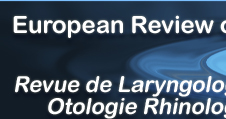 Issue N# 4 - 2010
Issue N# 4 - 2010

OTONEUROLOGY
Effect of vestibular neuritis on postural control using wavelets and fractal analysis
Authors : Lorin P, Manceau C, Foubert F. (Le Mans)
Ref. : Rev Laryngol Otol Rhinol. 2010;131,4:235-241.
Article published in english 
Downloadable PDF document english 
Summary :
Objective: What is the status of postural control a few months after an attack of vestibular neuritis (VN)? Using dynamic posturography and stabilometric signal treatment with wavelets and fractal analysis, we tried to answer this question by isolating the pathological postural parameters of VN. Material and method: The study involved a group of 15 patients (GP) who suffered from VN and were compared to a group of control subjects (GC). Both groups underwent videonystagmography (VNG), dynamic posturography (PDY), and assessment using symptomatic scales (ES). Results: GP and GC were comparable in terms of age mean, sex-ratio, average height and weight. The differences between GP and GC were the following videonystagmography criteria: spontaneous nystagmus (NS) (P= 0.005), head shaking test (HST) (p= 0.001), vibratory test (TVO) (p= 0.009). There were also differences in the symptomatic scales scores for the vertigo symptom scale (VSS) (p= 0.011), the dizziness handicap inventory (DHI) (p= 0.001), and the short form 36 (SF36) (p= 0.01). All the 84 new parameters of both GP and GC differ. This difference was significant (p< 0.05) in 16 cases (19%), and highly significant (p< 0.01) in 11 other cases (13%). The condition «unsteady platform» was the greatest determinant in both groups while the «closed eyes» and «HST» conditions were found to be non-discriminating. Conclusion: Vestibular neuritis affects new stabilometric parameters. These parameters are more adapted to the present set-up compared to previous parameters which are used to analyse non-periodic oscillations of posture. They are important in follow-up and rehabilitation of patients.
Price : 10.50 €

|



